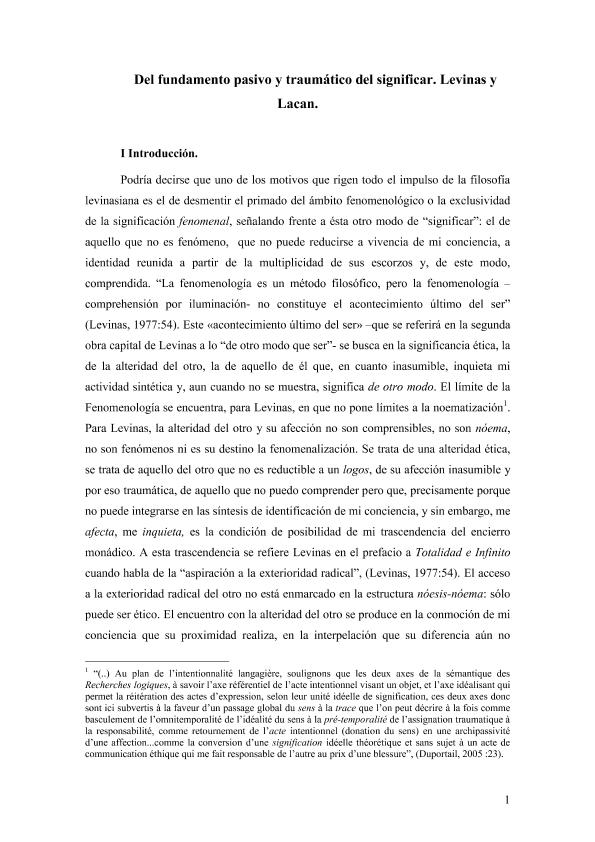Mostrar el registro sencillo del ítem
dc.contributor.author
Leconte, Mariana

dc.date.available
2017-05-24T21:45:30Z
dc.date.issued
2012-12
dc.identifier.citation
Leconte, Mariana; Del fundamento pasivo y traumático del significar: Levinas y Lacan; Universidad Nacional del Sur. Instituto de Humanidades; Cuadernos del Sur. Filosofía; 39; 12-2012; 135-147
dc.identifier.issn
1668-7434
dc.identifier.uri
http://hdl.handle.net/11336/16948
dc.description.abstract
El lenguaje como significación o sentido está en lugar de otra cosa que falta. Responde al vacío central -traumático- del campo del goce. Es suplencia fallida y, por lo tanto, al mismo tiempo reveladora de la falta que intenta suplir. En razón de esta función de suplencia, el lenguaje se encuentra estructuralmente alienado en el campo del goce. El intento de este artículo es dar cuenta de estas tesis del psicoanálisis lacaniano y extraer de ellas algunas precisiones para la comprensión de la diferencia entre Decir y Dicho en la fenomenología levinasiana del lenguaje, particularmente en lo que atañe a la articulación del orden sensible (vulnerabilidad) y el orden de las significaciones ideales.
dc.description.abstract
The language as significance or sense is in the place of something that is absent. It responds to the central -traumatic- gap of the enjoyment's field. It is a failed substitute and, therefore and at the same time, it reveals the lack that he intends to replace. Because of this function of substitution, the language is, in a structural way, alienated in the enjoyment's field. The intention of this article is to explain these theories of lacanian psychoanalysis and to extract some precisions for the comprehension of the difference between Saying and Said in levinasian phenomenology of language, particularly in what concerns to the articulation of sensible order (vulnerability) and the order of ideal significances.
dc.format
application/pdf
dc.language.iso
spa
dc.publisher
Universidad Nacional del Sur. Instituto de Humanidades

dc.rights
info:eu-repo/semantics/openAccess
dc.rights.uri
https://creativecommons.org/licenses/by-nc-sa/2.5/ar/
dc.subject
Lenguaje
dc.subject
Trauma
dc.subject
Significación
dc.subject
Lacan-Lévinas
dc.subject.classification
Filosofía, Historia y Filosofía de la Ciencia y la Tecnología

dc.subject.classification
Filosofía, Ética y Religión

dc.subject.classification
HUMANIDADES

dc.title
Del fundamento pasivo y traumático del significar: Levinas y Lacan
dc.type
info:eu-repo/semantics/article
dc.type
info:ar-repo/semantics/artículo
dc.type
info:eu-repo/semantics/publishedVersion
dc.date.updated
2017-05-19T13:31:00Z
dc.identifier.eissn
2362-2989
dc.journal.number
39
dc.journal.pagination
135-147
dc.journal.pais
Argentina

dc.journal.ciudad
Bahía Blanca
dc.description.fil
Fil: Leconte, Mariana. Consejo Nacional de Investigaciones Científicas y Técnicas. Centro Científico Tecnológico Conicet - Nordeste. Instituto de Investigaciones Geohistóricas. Universidad Nacional del Nordeste. Instituto de Investigaciones Geohistóricas; Argentina
dc.journal.title
Cuadernos del Sur. Filosofía
dc.relation.alternativeid
info:eu-repo/semantics/altIdentifier/url/http://bibliotecadigital.uns.edu.ar/scielo.php?script=sci_arttext&pid=S1668-74342010001100008
Archivos asociados
